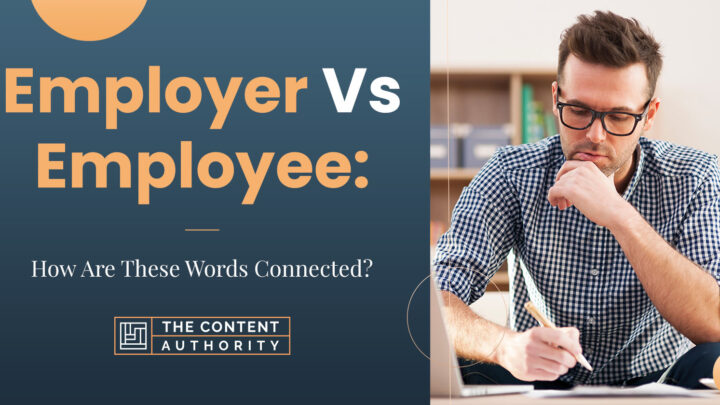The terms “employee” and “employer” are frequently used in business and entrepreneurship. Both concepts relate to the exchange of services and payment, two activities that are essential to business. Even though the phrases “employer” and “employee” may sound identical, it is crucial to understand the distinctions between them.
An “employee” is someone who gets a job and must work diligently to advance in their professional career and earn a respectable income. This is the main distinction between an employer and an employee. An “employer,” however, provides an employee with a job and financial compensation.
Employers have different roles, levels of power, and positions than employees. You might be able to manage the office atmosphere better if you comprehend each role and how they relate to one another.

What Does The Term “Employer” Mean?
The organization or business that places an employee to work engages them or hires their expertise is the employer. A person, a business owner, a government body, an organization, a consultancy firm, retail, an institution, or a non-profit organization can all be an employer.
The obligation to compensate an employee for services given rests with the employer, who must do so in a manner specified in the employment agreement or according to company policy. These methods include a paycheck, an hourly, daily, or weekly wage, and various work benefits offered by the company and are governed by local legislation.
In a workplace where a union is present, the employer must pay employees following the terms of the union-negotiated agreement. If a worker does not perform to the criteria provided at the time of recruitment or violates any employer-imposed restrictions, the employer is entitled to terminate the employee’s employment.
Employees may be hired as either exempt or non-exempt. An hourly wage is often given to non-exempt workers. If they stay past their shift’s end time, they might be paid overtime, typically 1.5 times their regular pay. No matter how many hours they put in, non-exempt employees are paid a set annual pay.
Employers rely on employees to accomplish specific business goals and have the right to fire workers who do not meet their expectations. An employer’s responsibility is to create a positive working atmosphere, and they can accomplish this by getting to know their staff members and learning about their hobbies.
What Does The Term “Employee” Mean?
An employee is an individual who works full- or part-time for a business or organization and is paid a salary as payment for the services provided. However, not everyone who offers services to a business or organization and receives payment for those services may be regarded as an employee.
An employee is employed by another entity, usually the employer, to do a specified task or to supply labor. The primary distinction between an employee and a freelancer is that although the employer has authority over the employee’s actions, the contractor works on a freelance basis.
The employment agreement, whether written, verbal, or implied, binds the employee and specifies their compensation or wage. The company that recruited the employee has control over the job that is completed by the worker and how it is completed; if they do not, they have the right to do so.
Each month, an employee receives a specific salary for their dedicated labor and commitment to the organization. An employee is assigned to higher positions, which come with greater salaries and additional benefits, based on the quality and productivity of their job.
An employee should keep good ties with both his or her employer and coworkers. A person need not need full-time employment to be classified as an employee; all that is required is that the individual work for their company and receive compensation for doing so.
How To Properly Use The Word “Employer” In A Sentence
It is easy to misuse a word when you do not know and understand how to use it in a sentence. We use the word “employer” when referring to a person who should engage an employee and compensate them financially for their services.
It is also used to refer to an individual who puts much effort into training staff members to be as productive and efficient as possible and to meet deadlines. You use the word “employer” when discussing a person with the power to dismiss another individual from their job in a company.
The word “employer” is used when describing an individual whose primary duties include providing workers with regular financial remuneration, access to healthcare, and a secure workplace. The word “employer” is a noun because it is a description of a person who is a business owner or a boss that provides employment opportunities to others.
How To Properly Use The Word “Employee” In A Sentence
You use the word “employee” when referring to an individual who performs work or provides services for a company in exchange for a set salary. The word is used when describing someone whose primary objective is to work hard, develop a strong professional network, and make a good living.
The word “employee” refers to a person paid a set amount of money every month in exchange for their efforts. It is also used to describe an individual whose main duty includes upholding a company’s values, working diligently, and following a company’s or business’s rules.
We use the word “employee” when talking about a person that provides the services and is compensated by the employer. The word “employee” is a noun used to describe any individual hired to provide services for the company, even if they are not necessarily workers.

Examples of The Word “Employer” And “Employee” Used In Sentences
We will further explain how to use the words “employer” and “employee” in a sentence and how they are related. We will be providing some examples of the words in a sentence. This way, you can differentiate them and know which one to use in different scenarios. Below are some examples of the word “employer” in a sentence.
- I always knew Apple was a big company, but I never fully realized how prominent they are until my uncle told me they were one of the major employers in several countries.
- Jessica had always been skeptical of her employer, and when he tried to harass her, she immediately kicked him in the nuts and called the police; her boss was then arrested for sexual harassment.
- After Mary heard the gossip at her workplace, she made a public statement that stated her boss was just her employer and that nothing was going on between them.
- My employer promised to increase my pay after 3 months of working, which is why I accepted the job.
Below are some examples of the word “employee” in a sentence.
- She used to be a simple dispensable employee at the firm until a few months ago when she was promoted to the firm’s managing director.
- I never knew the company had many workers until I glanced at the payroll and realized there were over 60 employees in the company.
- When the crowd at the café increased, several employees were asked to go out and organize a customer queue.
- John was a conscientious man who never commanded his employees to perform a task he would not do.
- The employee that was in my position previously was dismissed for being incompetent.
Final Thoughts
Both employers and employees engage in their jobs with different goals in mind. They could be tightly linked at times and then very dissimilar at other times. An employer’s responsibilities often include overseeing the safety of the workforce, paying workers, and achieving organizational objectives. However, employees are required to advance their companies’ objectives and aspirations.
Shawn Manaher is the founder and CEO of The Content Authority. He’s one part content manager, one part writing ninja organizer, and two parts leader of top content creators. You don’t even want to know what he calls pancakes.

